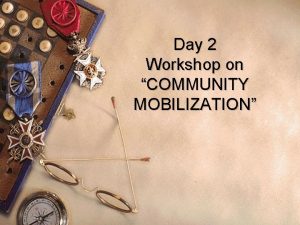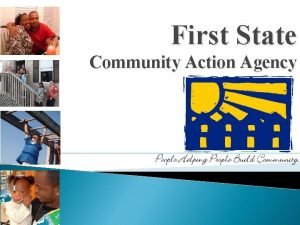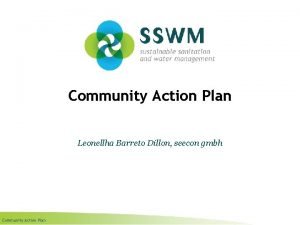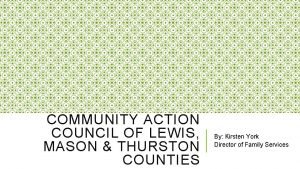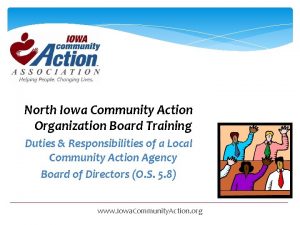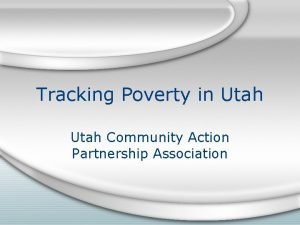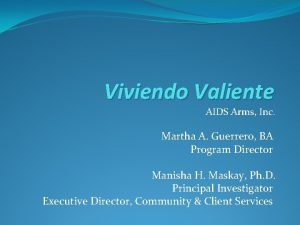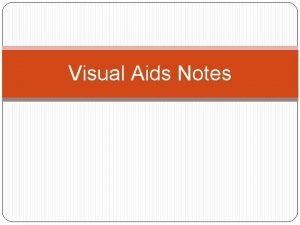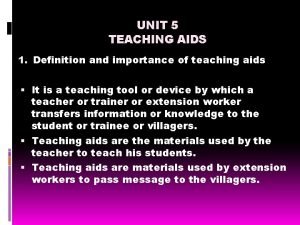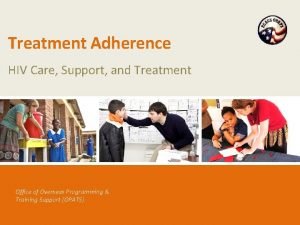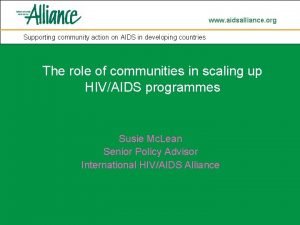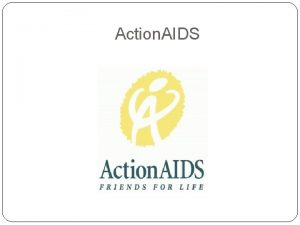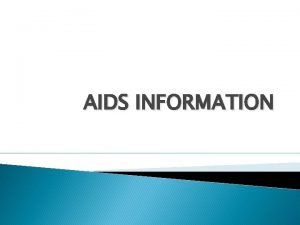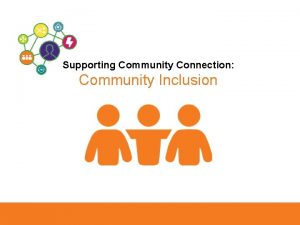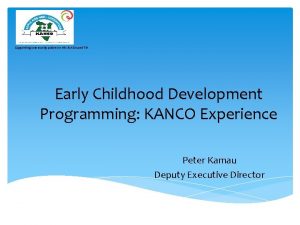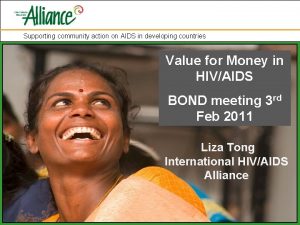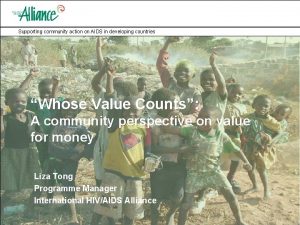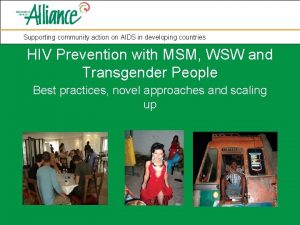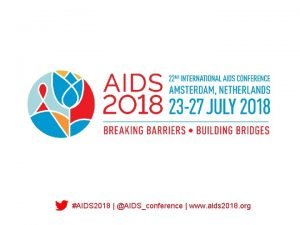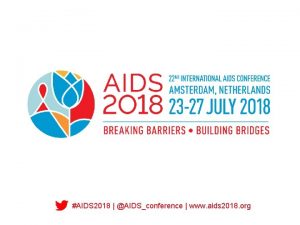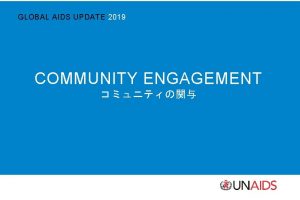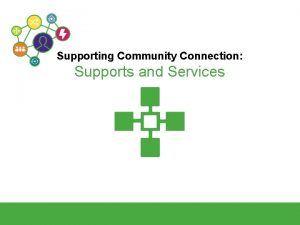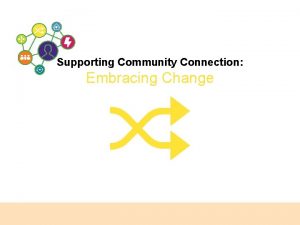www aidsalliance org Supporting community action on AIDS



















- Slides: 19

www. aidsalliance. org Supporting community action on AIDS in developing countries Sustaining adherence to HIV treatment: Health and Community systems Integration approach Christopher Chabu Kangale Acting Country Director International HIV/AIDS Alliance Zambia

Supporting community action on AIDS in developing countries Significant progress in treatment access Source: Ministry of Health 2008

Supporting community action on AIDS in developing countries Health Care Workers Crisis • Zambia is 28, 000 professionals short of MOH staffing targets; operating at 47% of required staffing

Supporting community action on AIDS in developing countries Number of health professionals & vacancy rates against proposed establishment 64% 71% Proposed MOH establishment 59% 72% 33% 17, 589 9, 787 4, 999 1, 864 % rural vacancies* 91% 58% 50% % urban vacancies* 38% 43% 32% Staff/population ratio Existing staff * Rural/urban vacancies reflect a sampling; not total MOH staffing (June WB report) 73% 473, 450 454, 512 43% 67% 100% 23% 21% 20%

Supporting community action on AIDS in developing countries Set up ARV Community Education and Referral Programme - Started in 2004 as an operations research Objectives • Increase community awareness of available HIV related services. • Increase access to and use of those services through referral systems. • Increase community understanding of the connections between HIV prevention, care, and treatment. • Support individuals to successfully adhere to treatment and practice preventive behaviors. • Support health care workers to deliver services and to help meet their own health needs.

Supporting community action on AIDS in developing countries …as an Operations Research • Research institutions included the Horizons programme and the Institute of Economic and Social Research of the University of Zambia • Baseline developed in four communities – two control areas and two implementing areas in Lusaka and the Copperbelt province • The International HIV/AIDS Alliance was implementing activities

Supporting community action on AIDS in developing countries Supporting health systems • Selected two health facilities Ndola General hospital – a referral hospital with a population catchment area of about 2 million people University of Zambia Clinic providing services to students and its surrounding areas.

Supporting community action on AIDS in developing countries Identified community health systems …through participatory assessments • Traditional Health Practitioners • Home Based Care providers ( particularly the Catholic Dioceses of Lusaka and Ndola) • Support groups of people living with HIV • Individuals living with the diseases • Young people through youth organisations

Supporting community action on AIDS in developing countries Treatment Support Workers and Treatment Mobilisers • They are all people living with HIV – 6 in total 3 TSW and 3 TM at the initial stage • TSW were trained and placed in health facilities to receive PLHIV, counselling for HIV testing, treatment preparedness and provide adherence counselling • TM were placed in the community to work with community members – referrals, education on ART and mobilisation

Supporting community action on AIDS in developing countries

Supporting community action on AIDS in developing countries Community health systems supported to provide care, education and referral • Traditional Health workers: trained, funded and supported in WHO staging, VCT and community mobilisation – refer clients to health facilities • HBC providers: trained in ART, anti-stigma strategies, referrals and home care support • Support groups of PLHIV: trained and funded to do community education, give testimonies of treatment success, referral Created buddy groups of PLHIV on treatment

Supporting community action on AIDS in developing countries Key Results of this intervention • Increased Knowledge about treatment mainly from peers (@baseline 1% reported peers as source of information – at endline 30% in Ndola and 47% in Lusaka) • HIV testing increased from about 25% of the respondents to 35% having tested

Supporting community action on AIDS in developing countries Key Results of this intervention • Adherence is very high – the mean in 4 day self reported adherence was 99%. Overall – both in Lusaka and Ndola adherence raged between 85 – 94% • Increased disclosure of HIV status which has contributed to reduced stigma in these communities • Replicated the idea in Uganda

Supporting community action on AIDS in developing countries Scaling up the intervention …based on the lessons • We have scaled up this programme into 13 districts – mainly rural district of Zambia with support from the Global Fund through ZNAN • We have now trained 256 TSW (157 women and 99 men) all PLHIV now working in and around 15 ART centres Our aim is to train 520 by the end of the year • We have also trained all of them in Stigma and discrimination reduction skills

Supporting community action on AIDS in developing countries

Supporting community action on AIDS in developing countries

Supporting community action on AIDS in developing countries

Supporting community action on AIDS in developing countries

www. aidsalliance. org Supporting community action on AIDS in developing countries Thank you for listening
 Plan together in community mobilization
Plan together in community mobilization In media res literary definition
In media res literary definition Hatchet plot diagram answer key
Hatchet plot diagram answer key Stages of plot development
Stages of plot development Exposition short story
Exposition short story Suit the action to the word the word to the action meaning
Suit the action to the word the word to the action meaning Community action mp
Community action mp 1st state community action
1st state community action Community action plan
Community action plan Community action model
Community action model Community coalition action theory
Community coalition action theory Restorative justice community action
Restorative justice community action Thurston county covid
Thurston county covid North iowa community action
North iowa community action Head start utah
Head start utah Aids arms inc
Aids arms inc Bad visual aid
Bad visual aid Transparencies visual aids
Transparencies visual aids Meaning of teaching aids
Meaning of teaching aids Aids pictures before and after
Aids pictures before and after
